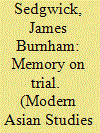|
|
|
Sort Order |
|
|
|
Items / Page
|
|
|
|
|
|
|
| Srl | Item |
| 1 |
ID:
093096


|
|
|
|
|
| Publication |
2009.
|
| Summary/Abstract |
The spectre of the 1937 'Rape of Nanking' continues to haunt China and Japan. Sixty years ago in Tokyo, the International Military Tribunal for the Far East (IMTFE) announced its definitive 'judgement' of what happened in Nanking. This judgement purported to be intractable. The legal process used to reach it produced a disputed picture instead. The resulting narrative confusion continues to inform how memory of Nanjing is shaped, used and contested. This paper explores the construction of 'Rape of Nanking' narratives at the IMTFE. By demonstrating the inherently contested nature of narratives produced by adversarial legal proceedings, it argues that using courts as a panacea for postwar restoration and as validators of traumatic narratives is both short-sighted and ineffective. The IMTFE exemplifies the inadequacy of trial-based post-conflict reconciliation. It is hoped that the lessons learned from Tokyo's limitations will benefit the ongoing quest for tenable models of international justice.
|
|
|
|
|
|
|
|
|
|
|
|
|
|
|
|
| 2 |
ID:
107067


|
|
|
|
|
| Publication |
2011.
|
| Summary/Abstract |
The International Military Tribunal for the Far East (1946-1948) or Tokyo IMT is overlooked for its contributions to modern international criminal justice. Convened to hold Japanese leaders accountable for conspiring to commit aggression, crimes against peace, crimes against humanity, and war crimes during the Second World War, the IMTFE was both a groundbreaking judicial undertaking and a pioneering multilateral institution. This distinction makes it a unique vehicle for exploring the fundamental challenges of both international justice and organisation. Institutions like the IMTFE are usually viewed through broad geopolitical, legal, and ideological lenses. Although important, these approaches miss a singularly important dimension of multilateralism: the human contingencies that impact international bodies. Using unique participant sources, this article presents an intimate "trial's-eye-view" of how working at the IMTFE affected the emotions, psychology, and temperament of its personnel. Participant responses on these very personal levels had profound consequences on the tribunal's proceedings, findings, and legacy. Other factors shaped justice in Tokyo, but the responses identified here were common, and their impact significant. Ultimately, this paper argues that people and their experiences-as much as anything-produced the outcome of justice in Tokyo.
|
|
|
|
|
|
|
|
|
|
|
|
|
|
|
|
|
|
|
|
|